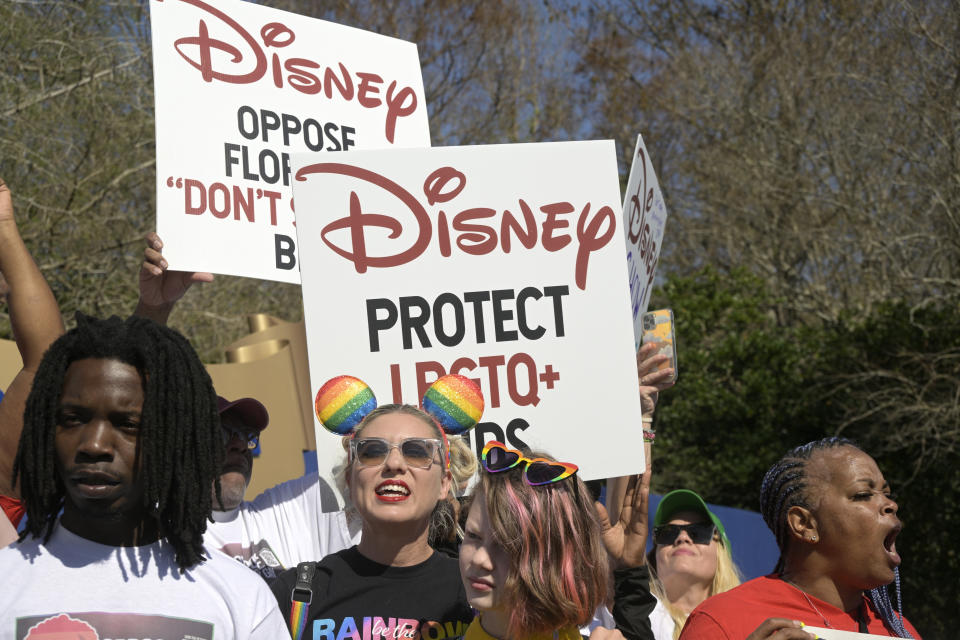Disney Isn’t Avoiding the Culture War Any Longer with Its Progressive Stance on Reproductive Rights

- Oops!Something went wrong.Please try again later.
Over the past few years, Disney has transformed from a company that scurried away from social issues (yes, much like a mouse) to one now at the center of the most divisive national debates. The conscious maneuver came amid tumultuous times and leadership changes.
After the bungled response — or lack thereof for a while — to Florida’s so-called “Don’t Say Gay Bill,” The Walt Disney Company stopped sitting out cultural fights. So when the Supreme Court overturned Roe v. Wade, the new PR machine at Disney was ready. Armed with a preplanned statement addressing the repeal, Disney sought to ensure employees that it would take care of them even in the face of backsliding civil rights.
More from IndieWire
Even though the language is muted, conservative critics have attacked it as a political statement. And that’s not the way Disney rolled under beloved longtime leader Bob Iger and his bulldog Zenia Mucha. Shortly after handing the keys over to Chapek, Iger’s longtime communications chief Mucha stepped aside. Geoff Morrell stepped in, albeit briefly; he lasted all of three months and was essentially a casualty of Disney’s “Don’t Say Gay” kerfuffle. Disney then tapped Kristina Schake for the key job; she was the right woman for the gig — and at the right time.
Schake is a former consultant for Hillary Clinton’s 2016 campaign and the Obama White House; her politics are no secret, and her hiring by Disney was no happenstance. So when Politico leaked the SCOTUS decision on Roe v. Wade ahead of time, it was Schake who made sure the company — and Chapek — wouldn’t appear unprepared or uncaring. A person with knowledge of the decision told IndieWire that Disney had the abortion-access statement ready to roll ahead of time. That checks out, considering the immediate timing of an internal email, which was provided to IndieWire.
The email reads, in part, “We recognize the impact that today’s Supreme Court ruling could have on many Americans and understand that some of you may have concerns about what this might mean for you and your families, as medical and family planning decisions are deeply personal. Please know that our company remains committed to removing barriers and providing comprehensive access to quality and affordable care for all of our employees, cast members and their families, including family planning and reproductive care, no matter where they live.”
The un-Disney-like preparation and response made the company among the first to say it would cover travel costs for its employees who must head out of state for the procedure, joining Netflix, Paramount, Comcast, Warner Bros. Discovery, and others. Taking a side so swiftly and decisively earned Disney and like-minded companies applause in the mainstream media and among liberals on social media.
“There’s so much risk involved,” Kellie McElhaney of UC Berkeley Haas School of Business told IndieWire. “You get paid to manage risks. But you also get paid to recognize benefits, or understand the benefits.”
McElhaney, founding director of the school’s Center for Equity, Gender and Leadership, said Disney recognizes the need to attract and retain workers, more than 50 percent of whom are women. And in the days of police brutality, anti-LGBTQ sentiments, and now this, she says “the dam has been broken” and companies recognize “it is no longer wise to stay silent on social issues.”
Frankly, Disney couldn’t ignore the noise if it tried: Workers staged walkouts in March to push CEO Bob Chapek to take a stance against the “Don’t Say Gay” bill. It eventually worked; Chapek ended up apologizing for his earlier inaction and said he would increase the company’s support to advocacy organizations and pause political donations in Florida, which recently has included checks for Republicans such as Gov. Ron DeSantis.

Phelan M. Ebenhack/AP Images for AIDS Healthcare Foundation
There are financial risks to taking a side, though not so much on the employee-wellness end. The costs of the abortion-access travel policy are likely nominal for Disney, which made over $2 billion in profit in the 2021 fiscal year. Some 80,000 of Disney’s 134,000 U.S. employees are in Florida, with tens of thousands more in California and New York. There are smaller numbers in over a dozen other states at Disney Stores, resorts, smaller corporate offices, and owned-and-operated ABC stations.
Florida has banned most abortions after 15 weeks, which is being challenged in court. The state saw 18.5 abortions per 1,000 women aged 15-44 in 2019. Among those, 2.3 percent were performed at 16 weeks or later, according to the Centers for Disease Control and Prevention. While admittedly imperfect math, those numbers and rates mean Disney could expect to pay travel costs of around 17 Florida workers per year.
It’s worth noting that even if the financial burden is lessened by an employer, time away from home and the logistics of arranging an out-of-state trip (not to mention requesting the benefit from HR) are other factors that could impact a person’s decision to seek the procedure. And while other states, such as Texas, have a smaller number of Disney employees, more restrictive bans will mean that a greater percentage of abortion-seeking employees may be forced to travel out of state.
In Texas, a ban on almost all abortions is set to go into effect later this summer. The abortion rate was 9.5 per 1,000 in that state in 2019.
There are other costs Disney is weighing for its newfound voice. States including California, New York, and Massachusetts have enacted policies that shield doctors from consequences from providing abortions to out-of-state patients — with the idea that states with abortion bans would seek to prosecute doctors who perform the procedure on their citizens. It raises the question of whether those states could go after companies that offer travel assistance.
One cost to Disney is the potential loss of anti-abortion rights guests at its theme parks and consumers for its products, movies, and TV shows — an idea gleefully raised on “Fox & Friends” on Monday. On a lesser scale, there was blowback when Disney axed Gina Carano from “Star Wars” for comparing the plight of Republicans to being Jewish during the Holocaust. She’s since been embraced as an icon of the right: The Daily Wire tapped her as part of its ambitions to build a red streaming empire.
Taking a stand can also be good for business. McElhaney pointed to Dick’s Sporting Goods’ decision to scale back gun sales following the Parkland shooting in 2018. While the company lost millions in sales initially, revenues rebounded and profitability picked up thanks to the improved margins on merchandise that replaced guns. A precise comms strategy was key to making it all work, executives told researchers. (Like Disney, Dick’s also had a swift response to Roe being overturned: It’s providing up to $4,000 to employees who travel out of their homes states to seek an abortion.)
While McElhaney lauded the swift action companies took in response to the restriction of abortion rights, she said there’s much more corporations can do.
“What I have not seen is companies who have such a vast amount of lobbying and political heft” using it to push for change, she said. “What happens to the poor woman in rural Mississippi who doesn’t have a job and becomes pregnant?”
Best of IndieWire
New Movies: Release Calendar for July 1, Plus Where to Watch the Latest Films
The 35 Best Romance Movies of the 21st Century, from 'High Fidelity' to 'Carol'
All the Details on 'Hunger Games' Prequel 'The Ballad of Songbirds and Snakes'
Sign up for Indiewire's Newsletter. For the latest news, follow us on Facebook, Twitter, and Instagram.

